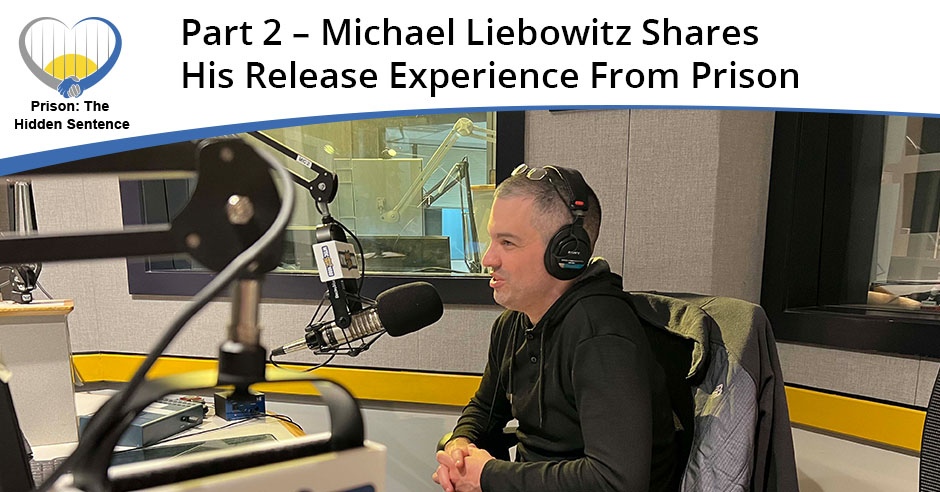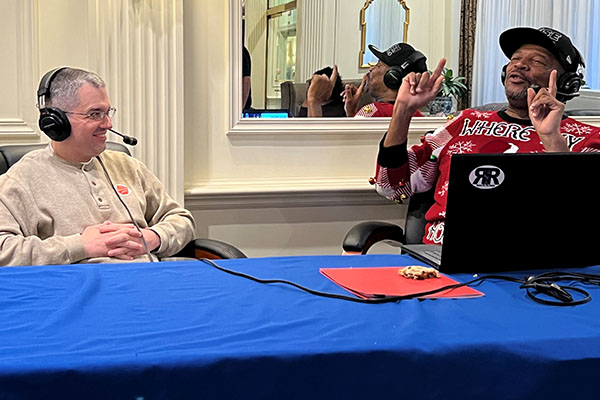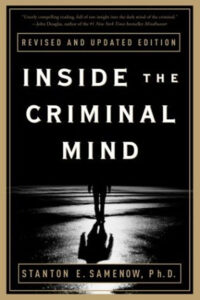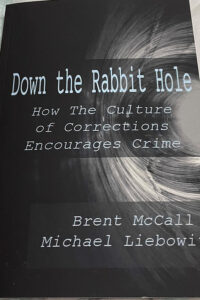
“Sometimes a person needs to hear hard truths to change.” – Michael Liebowitz.
In Part 1, Michael shared his journey to rehabilitation while incarcerated for 25 years. He had prepared for the day of his release from prison for many years. In this second part of his conversation with Julia Lazareck, he shares how fortunate he is to have family support and a place to live. He explains how his hard work while incarcerated has prepared him to lead a successful life as he enters into society. For anyone who has or had an incarcerated loved one, you’ll want to hear Michael’s advice on supporting your family members and what helped him. He continues his work, and we look forward to his talk show. Listen to this inspiring episode with Michael and see how there is no shortage of hope even after prison.
—
Listen to the podcast here
Part 2 – Michael Liebowitz Shares His Release Experience From Prison
Before we start the podcast, I’d like to remind you that Prison: The Hidden Sentence is offering workshops to help families support their loved ones through incarceration and release as well as workshops on self-care and empowerment. Go to PrisonTheHiddenSentence.com or email Contact@PrisonTheHiddenSentence.com. This is where you’ll find the tools to help you get the information you need when a loved one is in the carceral system. Enjoy the show.
—
I’m back here with Michael Liebowitz. In part one of this episode, he shared what it’s like being incarcerated as a young man and turning his life around while in prison. In part two of this episode, Michael is going to share what it was like being released from prison after 25 years and what helped him adjust to what he’s doing to help others and his future goals. Michael, thanks again for joining me. Let’s talk about when you found out that you were being released and your sentence modification.
Before I do that, I want to thank you again for having me. I appreciate the opportunity to reach people that I would, otherwise, never had a chance of reaching. I got what is called sentence modifications. That is fancy talk for having your sentence reduced. Initially, I had my sentence reduced by two years and then another three years.
How many years had you been incarcerated this time before you heard about the sentence modification?
The first sentence modification I got was in 2019. I had 22 years in at that point, and then this last one that I got was in July. I had 25 years in. It was funny because when I filed it, I thought it would take about a year or so to even get a response. Within a couple of weeks, they gave me a response and a court hearing. I went to the court hearing and they reduced my sentence by three years. That meant that I would be getting out in four months, whereas otherwise, I wasn’t even parole eligible for another sixteen months.
When you got to go to court, was that on a Zoom or did they bring you to jail, and then you go into the court?
They brought me to court. It differs by which jurisdiction you’re in because when some guys go for those hearings, they get to have a Zoom meeting, but I went to court.
Did they bring you straight from prison? A lot of times you have to sit and they bring you to jail to wait.
It’s the same thing. It’s what we call a court trip. I had to go to one prison and wait there for another bus to come, then the bus takes you back to that jail, and then back to this jail again.
It’s so that people will know what the actual process is. When you file did you file it or did you have an attorney help you?
No, the attorneys were all far too expensive. For the first modification, I did have an attorney. For the second one, the funds of my loved ones were significantly depleted. I ended up having my friend, the same friend that’s allowing me to live with him. He filed all the paperwork for me.
Let’s go back to the sentence modification.
I went and had the sentence modification. They wake you up at 3:00 AM when you have a court trip. I was utterly exhausted by the time I got there. There’s something interesting about this sentence modification hearing. I had a packed courtroom full of people supporting me. Speaking for me was a former state senator who claimed to fame in large part because he was tough on crime. He spoke on my behalf. An ex-police officer spoke on my behalf. A local blogger here in Connecticut and a syndicated columnist spoke on my behalf. A talk show host who has me on his show on a regular basis spoke on my behalf. There were a lot of other people supporting me.
The prosecutor conceded in court that I had done more than any other inmate he had ever seen in all his time to rehabilitate myself and yet he still opposed me. He still said that I shouldn’t be given a chance. He thought that I should do the rest of my sentence. I had to make an argument against him. It was funny because, in my mind, I knew I had to do a high-wire act. I had to combat his arguments, but I also didn’t want to come off as too combative. It was a very difficult path to walk. Ultimately, I was able to do it and the judge told me I’ll have my decision in a couple of days and she did. Three days later, I found out that I was going home. It was a good feeling, but it was also a little bit nerve-wracking.
We talked about that. As you said, you spent more time in prison than you did outside of prison and that’s where you grew up and what you knew. That feeling of, “Yey, I’m coming out” and “Oh no, I’m coming out.” How did you deal with that?
Luckily, I had people to talk to. I have a girlfriend and a friend I’m living with. I was able to talk to them. Also, I talked to my sister. They helped me out. People maybe don’t understand, I had never lived on my own. I never paid bills, rent or water bills. I never had a relationship with a woman as an adult. I never held a job. All these things, I’m coming out into the world. I’m essentially a teenager and an immature teenager with that.
I knew it was going to be tough and it can be overwhelming. It’s not just sunshine and roses where I’m going out and everything is going to be great. I knew that there was going to be a tendency for things to get tough. It hasn’t all been easy. There have been occasions where I’ve been overwhelmed emotionally. Luckily, I have a support system. A lot of times, it comes back to that support system and I’m very fortunate to have it.
Coming out into the world from prison will be tough and overwhelming. It's not just sunshine and roses. Share on XYou really are. A lot of times when people are released from prison, they might have to go to transitional housing and pay for it and get approval to live in a place. There are so many things. You have a friend that is letting you stay with him while you get adjusted because you’ve only been out a month. With a lot of things that people coming out of prison have to deal with, you are very fortunate and you say that a lot. You’re in this house and get to live with somebody that’s supportive. You have a supportive family. We both know that you’re very fortunate.
Yes. It’s huge.
Not everybody has that support. If you’re reading this, it’s very important that you support your loved one while they’re incarcerated and when they come home. In the first part, Michael has given some good advice on ways that you can help prepare and also support your loved one. I thought that was good information.
You got the sentence reduction. You had these powerful and wonderful people supporting you that helped you prepare for coming out. I’m always curious about that release day. Do you just walk out? Do they put you on a bus? What was it like walking out of those doors that you’ve been inside for so many years?
It was surreal. My friend picked me up so I didn’t have to take a bus anywhere, but it is an option. You can take a court trip and get dropped off at the nearest county jail or the county jail nearest to where you live. I didn’t have to do that because my friend came and got me. I waited for the call. I was up and I had my stuff packed. I had a sweatsuit on and I was ready to go. I don’t know if you’ve ever seen the cartoons where the guy runs and then there’s a big human-shaped hole in the wall, but that’s basically what it was. I had no desire to stick around. Once they told me I could go, I was gone.
What was it like being in the car? You said you’ve been on a bus. I’ve spoken to other people that had adverse reactions to being in a car. How long was that car ride, and how was that?
My girlfriend lived right down the street from the prison, so I wanted to stop by and say hi to her first. We drove over there which was maybe five minutes. I stopped by there. I was able to give her a hug and say hello. I then wanted to go into a store and get a soda and a candy bar. I don’t know why that came into my head but it did. I wanted to go and experience going into a convenience store, so we did that.
I went to my friend’s house, got a change of clothes, and went out to breakfast. I had a very long day on my first day out and driving around. I thought I was going to be very nervous around people and I wasn’t. It was fine. I wasn’t in a great crowd of people. That would’ve been overwhelming. There were a few people at that time. It was great. We go to my friend’s father and stepmother. I had breakfast with my sister. My first day out was a very beautiful day. I enjoyed myself.
That sounds wonderful. I hope everybody has that experience. When you went to get your soda and chocolate bar, how did you pay for it? I’ve heard stories of things that have changed so much. Did you have cash?
My friend had the cash. I didn’t have anything so he paid for it, but it was funny because he went in first and there was a cop in there and he told the cop, “Whatever my friend tells you, it’s true.” I walked in and I saw the cop. I said, “How are you doing? I just got out of prison after 25 years.” I’ve had quite a bit of fun telling people that because they’re always very shocked, except for when they know who I am from listening to the radio. They are like, “You’re that guy.” “Yes, I’m that guy.” It’s fun. It’s been great.
People have been far more accepting of me than I would’ve expected. People have been very kind to me and more people than I thought. I have no complaints along those lines, but my experience is very different from what a lot of people go through when they get out of prison where people don’t want to talk to them or hire them. It’s a very tough situation to be in. I hate to overuse words, but I don’t have a better one for fortunate, and I’ve been very fortunate.

I agree. Since you’ve been out, what have you been doing?
In the most amount of time, I have a goal that I want to become a talk show host. My time has been spent trying to prove my mettle in that regard. I’ve been booking guests for the radio show that I’m on. It’s funny because some of these people are my heroes. I’m talking to them or emailing them. Getting on their show has been absolutely a phenomenal experience for me. To backtrack a little, I mentioned in the last interview the book Inside the Criminal Mind by Stanton Samenow. I’ve been able to talk to him on the telephone. He wrote a review for the book that my friend and I wrote.

I saw that.
It’s been awesome. I’ve been doing that every day. I’ve been doing more interviews. I was on the show for three hours one day and I was on for another show for an hour. I’m trying to prove my worth. I understand that that’s how it’s got to be. I can’t walk in and say, “Hire me and start paying me.” I know that I have to be willing to earn my stripes first. That’s every day and all day. I’m reading articles, listening to podcasts, or sending emails. I love it. It’s not a hardship for me at all because it’s what I’ve cultivated to enjoy. It is what has become my value system. It’s working hard and trying to get things done. I am at my highest comfort level when I’m in that zone.
This started while you were incarcerated. Everything that you’re doing, the reading and preparing for this has culminated to now that you’re out, you want to share this knowledge and help people. You want to be a radio host or a talk show host, and you can do it. There’s a story that somebody told me of this woman who was incarcerated. She had a vision board that she made and she carried it with her while she was incarcerated. She had this vision board of things that she wanted to do when she got out, and she accomplished those things.
You might not have had a physical vision board, but you’ve had this vision of what you want to do and it started while you were incarcerated. It’s so important for people to do that. Start while they’re incarcerated. They can’t wait until they come out because there are going to be so many challenges. Even though you’ve been fortunate, what are some of the challenges that you’ve faced since you’ve been out?
I didn’t experience any of those challenges until the last few days. It’s the Christmas season and I had to go to a couple of gatherings, be around that many people in close proximity, and mingle and answer questions about my incarceration and how tough is it to get out. It’s funny because in this situation, I’ve done so many interviews where people ask me what it’s like to be out of prison or what it was like in prison and I do fine. In a social environment to have to keep answering that and addressing it has been tough. The last couple of days have been emotionally overwhelming.
I was at my girlfriend’s house and I broke down. I started crying. She told me, “What’s wrong?” I said, “It’s too much for me. I bit off more than I can chew.” It’s no disparagement against any of the people at the gatherings. They were all so friendly and nice to me. They’re very welcoming and accepting. It’s just not something I was prepared for to be around that many people. It was a bit much.
Maybe it’s good that I went through it because I’m a big believer in coming out of my comfort zone. That’s how I grow and expand myself. Probably, in the long run, I’ll view it as a good thing, but while going through it, it was a tough thing. Other than that, there haven’t been any challenges. I shouldn’t say any. There’s been nothing to speak of or nothing like that where I would say, “My God, it was so difficult to face or so difficult to deal with.”
One of the things that when somebody does come out is the stimulus because you haven’t had all of the people around you. We do talk about when a loved one comes home to not have this big party or take them to the mall, you have to do it slowly. It would’ve been worse if you did this when you first were released. At least you’ve been out, you’ve been to the store, with small groups of people, and gone out to eat leading up to it. We have to realize what life is like when somebody is incarcerated. It’s the same things and same rooms day after day, and then we bring these colors, people, cars, lights in, and all of these things that are going on.
I can understand why that would’ve been a little overwhelming having so many people. You said you’re open to talking about things and you have been on a lot of talk shows and interviews. However, for somebody on the outside, when we meet somebody that’s just come out of prison, what are some of the things that we can ask that are appropriate that won’t make you feel bad? You say, “Ask me anything,” but generally give us some advice on things we could ask.
I wouldn’t have known it, but I’ve learned it now and I’m hesitant because I don’t know if this is applicable to me or if it would be everybody’s experience. The two things that I don’t like being asked over and over again are, “What was it like in prison and what is it like being out?” I hated prison. I don’t mean I hated prison as far as being locked up. I hate the prison culture. I hate the things that are said in prison, the things inmates do, the staff, and everything about it. I can’t stand it.
Even talking about the food and things inmates make. I never liked it. I never liked getting into that stuff. I don’t want to talk about how it was in prison. Not that I never say, “It was like this,” or make a joke. I don’t care if someone makes a joke about being in prison, but ask me intimately, “What was it like in there? What was the toughest thing? Since you’ve been out, what’s been the biggest struggle?”
I just asked you that.
In this context, it’s very easy for me. I don’t mind answering it at all, but at a party or a social event and you don’t know anybody and it’s like an intimate thing. One person asks you and then I explain it. I ultimately know that no matter what I say, the person’s not going to understand. There are going to be these follow-up questions and I don’t even know if they care or if they’re asking me to be polite or they think it’s expected or they feel compelled to say something, and that’s the only thing that they have to say.
When I’m talking to you, I have a goal. I want to enlighten the public about what goes on in prison or what it’s like to transition to society. I know you have the same goal. There are no pretenses or obligations here. At a social event, there are all types of implied obligations and it’s too much. They have to answer those questions on top of it. For me, those two questions were a bit much.
I’m not casting aspersions on anybody at these parties that ask me the questions. I understand their curiosity or why they might feel compelled to ask it. I’m only saying how it makes me feel. There’s no way those people could know that. They don’t know what’s going to trigger me and not going to trigger me. I’m not blaming them. I’m trying to respond as honestly as I can. You asked me what shouldn’t you ask a prisoner when he comes out and those are the two questions that I found the most disturbing or the toughest to answer.
People on the outside don’t understand. That’s why it’s so important for you and me to go out and speak and raise awareness because it’s a whole other world. When somebody is taken into the prison system or you’re incarcerated and you’re a family member on the outside, it’s like entering this whole another world. A lot of it doesn’t make sense. We try to make sense of it and try to make things better, and that’s what you and I are doing and that’s why we do this. I appreciate you saying that.
Anybody that’s reading this, if you’ve done any of these things, it’s okay because just like anything, we learn and that’s why we listen and read so that we can be better, treat people better, and treat people with more compassion. That’s what it’s all about. Before this happened when you were younger or I was younger or watching the news, and then they showed somebody who was arrested and you’re like, “My gosh, that’s a horrible person,” and then you get older and you realize these are people and not everything that you see on the news is true. The truth is in the middle somewhere.
We know that there are a lot of people that are incarcerated that are innocent. It can happen to anybody and that’s my message. It can happen to anybody and when it does, whether the person is innocent or guilty, we know how to support that person. That’s why it’s so important to talk to people like you who have been incarcerated and can provide knowledge and is open to sharing anything.
I like to talk about what it’s like coming out so that people on the outside as they’re preparing for their loved one to come home, that they have proper expectations that the person’s not going to walk out and be the same person. You’re not the same person. However, you’ve done things to improve yourself. That’s what we’d love for people to do and for people on the outside to encourage and mentor their loved ones. You’re out and have spoken about what you’ve done and how you’ve acclimated. Everything you did on the inside has helped you acclimate now. It is going to be 2023. Aside from being a talk show host, what is 2023 going to look like for Michael?
You’ve eliminated the main thing with the manner in which you asked the question because that’s what I’m going to devote most of my time to. Other than that, I hope to be a good friend, good brother, good family member, good boyfriend, and ultimately, a good human being. That’s been my main goal. I want to be a person of sound character and rock-solid integrity.

It’s not always easy because I don’t always know the right thing to do, but I’m going to continue striving to be that person because that’s what I want to be. Whatever the effort required or how much work I have to do, I’ll do it. I’ve been doing it for a long time and quite frankly I don’t see any other alternative and not a good one anyways. I don’t want to end up that person I used to be. I’ll do everything in my power to prevent that from happening.
You will because you’ve been preparing for this. Once you have your talk show, we’ll let people know about it. It’s so important for people to listen to things like this to expand. You’re talking about being a better person, that says it all. People reading this are going to help so many people. I know there are people that are going to want to get in touch with you too. We didn’t talk about that in the last episode, but if somebody wants to reach out to you, what is the best way to reach you?
They can email me at Liebo1271@gmail.com or connect with me on Twitter at @LieboIsOut.
I love that. I wish you so much success. You’ve come so far and have helped people like Carlos and you continue helping other people. Your book is out there that is going to raise awareness about changes that could be made in the prison system. I don’t think this is the last that we’ve heard from Michael Liebowitz. You’re going to be doing great things in the coming year. When I asked you about 2023 along with being a good person, continuing what you’re doing, or being a talk show host, you’re going to continue being a bright light and show that people can change. Thank you so much. Anything else you want to talk about or say?
First, I want to thank you again for affording me this opportunity. It’s great to always get this message out and talk about these issues. One thing I would like to say is compassion because I heard you use the word compassion. A lot of people mistake being overtly kind for being compassionate. Sometimes a person needs to hear hard truths in order to change. You don’t help a criminal to change by telling him he’s a great person and it’s not his fault he’s in jail. To me, compassion is looking somebody in the eye, being honest with them, and doing what is necessary to help that person become better.
You don't help a criminal to change by telling him he's a great person and it's not his fault he's in jail. Compassion is looking somebody in the eye and being honest about what is necessary to help them improve. Share on XThat reminds me of cancer. It would be nice if having a cherry popsicle can cure cancer. It doesn’t. Ultimately, the treatment for cancer is very unpleasant, chemotherapy or radiation therapy. Nonetheless, that’s what’s necessary. Sometimes you need to tell people hard truths in order to help them change. That to me is compassion. With that, I have nothing more to say. Again, I appreciate you, Julia. Thank you so much.
Thank you. Together, we’re making this a more compassionate world.
I certainly hope so.
—
For more information on what to do when your loved ones are arrested, what you need to know about the court process, information about incarceration and visitation, and most importantly, self-care, you can find all of this and more in the Prison: The Hidden Sentence book that can be purchased on Amazon. This book contains crucial information for anyone that has a loved one in the carceral system.
Important Links
- Contact@PrisonTheHiddenSentence.com
- Liebo1271@gmail.com
- @LieboIsOut – Twitter
- Prison: The Hidden Sentence
- https://www.Audacy.com/wtic/topic/michael-liebowitz
- https://Donpesci.Blogspot.com/2018/02/down-rabbit-hole-book-review.html
- https://PrisonerMike.com/down-the-rabbit-hole/
- https://PrisonFamiliesAlliance.org
- https://PrisonTheHiddenSentence.com
About Michael Liebowitz
 During 25 years of incarceration, Michael Liebowitz read over 650 books, attained two associates degrees, completed two certificate programs, and coauthored “Down the Rabbit Hole: How the Culture of Corrections Encourages Crime “. He also became a regular guest on “The Todd Feinburg Show “, a popular radio show in Connecticut. Since being released in late November, he has been pursuing his goal to host a talk show.
During 25 years of incarceration, Michael Liebowitz read over 650 books, attained two associates degrees, completed two certificate programs, and coauthored “Down the Rabbit Hole: How the Culture of Corrections Encourages Crime “. He also became a regular guest on “The Todd Feinburg Show “, a popular radio show in Connecticut. Since being released in late November, he has been pursuing his goal to host a talk show.
- 1. Inside the Criminal Mind , by Dr. Stanton E. Samenow
- 2. The Criminal Personality,Vol.1, by Dr. Samuel Yochelson and Dr. Stanton E. Samemow
- 3. The Criminal Personality, Vol.2, by Dr. Samuel Yochelson and Dr. Stanton Samemow
- 4. Prisoners of Hate: The Cognitive Basis of Anger, Hostility, and Violence
- 5. The Psychology of Self-esteem, by Dr. Nathaniel Branden
- 6. The Psychology of Criminal Conduct, by James Bonta and D.A. Andrews
- 7. As a Man Thinketh, by James Allen
- 8. Atlas Shrugged, by Ayn Rand
- 9. The Virtue of Selfishness, by Ayn Rand
- 10. How to Think Straight, by Antony Flew

Leave a Reply